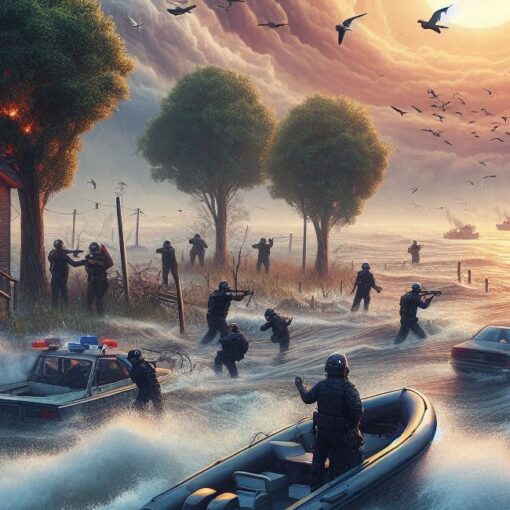Top Takeaways and Key Concepts
→ Build a basic emergency kit with water, non-perishable food, flashlight, and first aid supplies.
→ Prepare a family communication plan so everyone knows how to connect during disasters.
→ Store essential documents safely like IDs, insurance papers, and medical contacts.
→ Keep backup power and communication tools such as radios, extra batteries, and chargers.
→ Pack clothing, shelter, and tools to stay warm, dry, and prepared for power outages.
Summary of This Article
This article explains why emergency preparedness matters and how to stay safe when natural disasters strike unexpectedly. It walks through building a survival kit with food, water, first aid, flashlights, and weather radios, while also stressing the importance of communication plans and storing important documents securely. The article encourages packing backup clothing, having temporary shelter options, and keeping basic tools like multi-tools and duct tape. With preparation, anyone can handle chaotic situations with confidence and safety.
Short Video Version of this Article
Please Note: This post may contain affiliate links. If you click one of them, we may receive a commission at no extra cost to you. As an Amazon Associate, I earn from qualifying purchases.
Natural disasters might be just like that pesky guest that shows up at your party uninvited. You know, the one who eats all the snacks and then makes a mess. It seems like hurricanes, wildfires, floods, and earthquakes happen more often these days, just like I gain weight after eating all the holiday delicacies.
It’s really crucial to be ready for unexpected surprises. It’s like getting ready for a trip by bringing your favorite toys. You need to have the correct tools so you can handle everything. Let’s talk about the things you need to get through terrible situations.
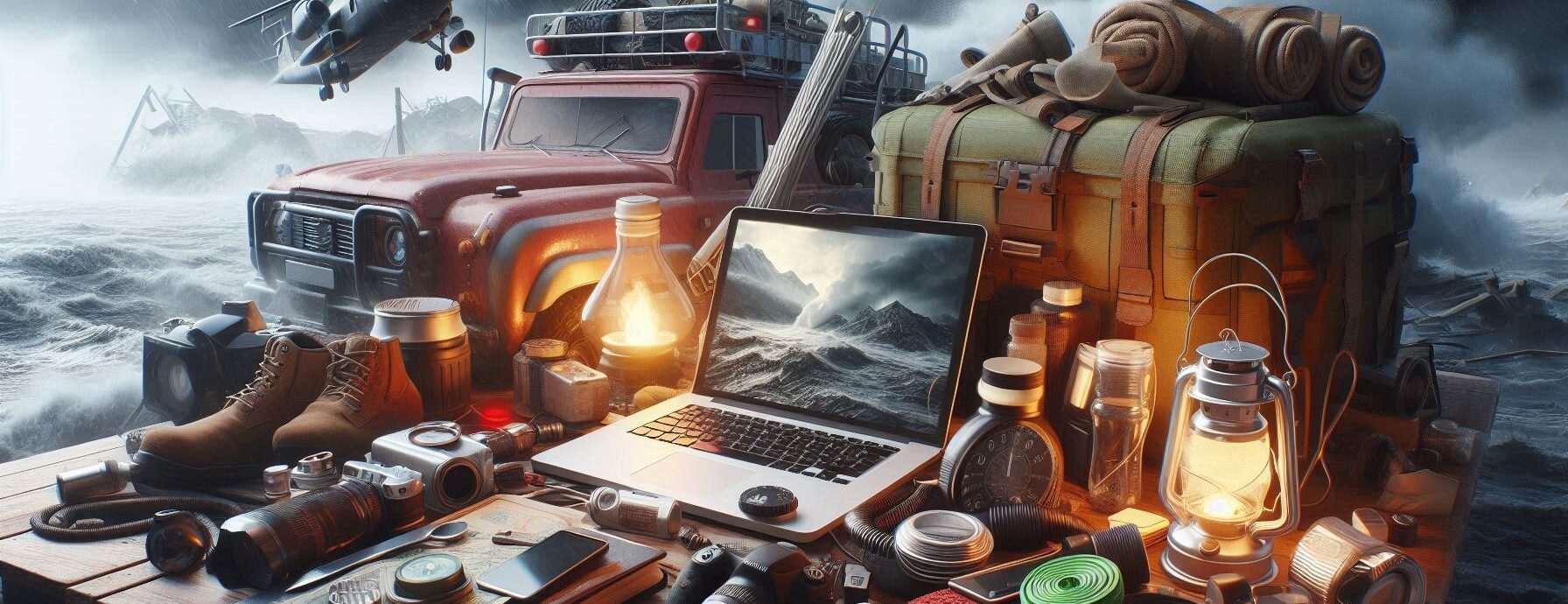
First of all, you need a good emergency pack. Think of it as a bag that will save your life. You will need stuff like batteries, flashlights, and a first aid kit. Things like band-aids and antiseptic wipes to treat small cuts and scrapes. Those small packets of magic are quite useful when you need them!
Food is also very important. Get some simple foods, such soup cans and granola bars. Things that don’t need to be cooked are great. And don’t forget to drink water. You can’t have too much of it, you know, since it makes you feel good.
A weather radio is another good option. It helps you keep up with what’s going on outside when things become crazy. You can hear where the storms are and what you should do. It’s like having a friend tell you what’s going on when things get chaotic.
It’s also important to have decent shoes. You should feel good when you’re on the go. If you need to walk somewhere, sturdy footwear can help. You may even get a warm blanket, which is like a hug you can take with you.
When you have these things, you’ll feel better, like you’re ready to deal with any party crasher. It’s all about feeling safe when things go bad. Things could get messy, but if you plan ahead, you can deal with whatever life throws at you. Take a deep breath and know that you’re ready!
The Basics: What You Really Need
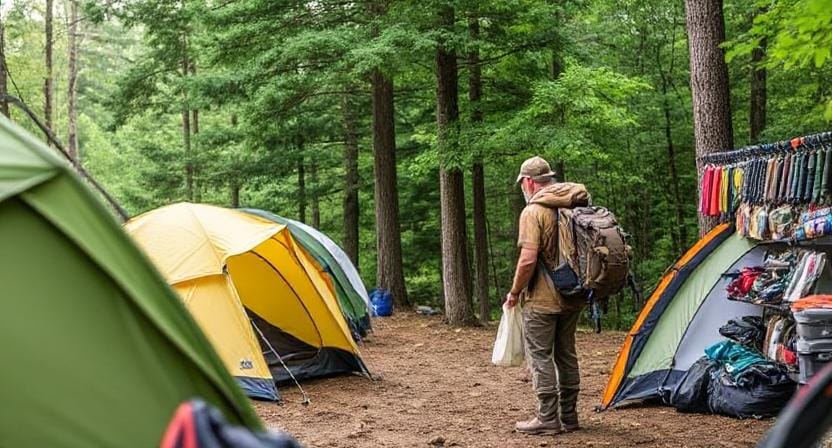
First things first: let’s talk about the essentials. I mean, if you’re going to survive an earthquake while wearing pajamas and slippers (which is probably what I’d be doing), you need to have some basic emergency gear ready. Think of this as your survival starter pack.
You’ll want to start with a sturdy backpack. This isn’t just any backpack; it should be big enough to hold your supplies but not so big that it makes you look like you’re preparing for a month-long trek through the Himalayas.
Inside your trusty emergency bag, you need to pack some non-perishable food. Granola bars are awesome, and canned goods work too. No one wants to eat cold beans straight from the can—yikes! Unless you’re super hungry, then maybe, but still, let’s not go there.
Next on the list is water. It’s super important, especially when everything feels messy and loud, like my kids arguing over what movie to watch on family night. Aim for at least one gallon of water for each person every day for three days. That’s a lot of water! It’s about what I drink in a week when I’m not glued to Netflix.
Imagine how much better it feels to have fresh water when you’re feeling anxious. It makes you feel better and gives you a boost. When you’re well-hydrated, your mind is sharper, like a superhero ready to go!
So, get the food and the water. You’re establishing a safety net for when things go wrong. It’s like getting ready for a nice trip, but with more at stake. You will be ready for everything that comes your way. Also, you’ll have tasty snacks to eat while you wait. You can’t beat that, can you?
First Aid Kit: Band-Aids and Beyond
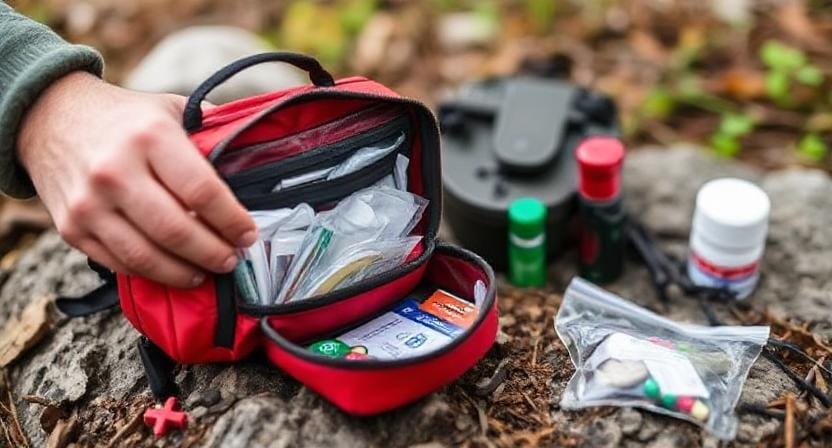
Have you ever tried finding a Band-Aid in an emergency? It’s like searching for gold in your backyard—you know it’s there somewhere but good luck actually locating it! That’s why having a well-stocked first aid kit is crucial.
Your first aid kit should include adhesive bandages (the fancy ones with cartoon characters are optional), antiseptic wipes (because germs don’t take vacations), gauze pads, scissors (for those “oops” moments), and pain relievers.
Make sure to pack any personal medications or allergy treatments. Imagine sneezing non-stop when you really don’t want to! That’s not the best way to handle a tough situation. Keeping your meds handy is like having your own superhero cape.
It’s easy to remember food and water, but don’t forget about your mental wellness. That’s also very important! Stress can sneak up on you like a cat in a room full of paper. Put in some things that will make you feel better, such fidget toys or a little diary. Writing down your thoughts can help a lot. It helps you think more clearly, like cleaning a hazy glass so you can see better.
Even the greatest fighters need to rest. Imagine taking a minute to breathe, pinch a fidget, or sketch a silly picture in a journal. It’s all about feeling better in the middle of the craziness. Taking a short break can help you get your thoughts together and get ready for what’s next.
So, get a lot of those things. Your backpack should feel like a warm hug that is ready to help you with everything. When everything around you is going crazy, you’ll have your little bits of comfort hidden away. It’s all about being ready for whatever that life throws at you, even the unexpected.
Communication Gear: Staying Connected
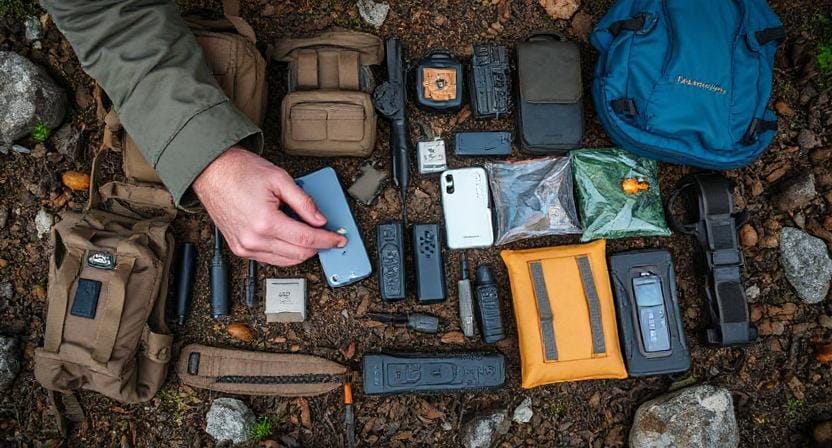
Communication during natural disasters can feel like trying to send smoke signals from inside a tornado! Cell service often goes haywire when disaster strikes; therefore, having alternative communication methods is vital.
Getting two-way radios is a smart move. They’re like little lifelines if cell towers go down. You know how fast my workout plans disappear after the holidays? Yeah, that quick! With radios, your family can still chat and make plans, even when the phones don’t work. And let’s face it, they’re kind of a blast to use! Just maybe keep the gossip about the neighbors for book club chats instead of over the radio.
Think about portable chargers too. They’re lifesavers during power outages when you really need your phone. You know, like when you want to check Google Maps or, let’s be real, watch those adorable cat videos. It’s always when the power goes out at the worst time. You’re trying to find your way home, and bam! No juice on your phone.
So, packing those chargers can keep your devices alive longer. It helps you stay connected, which is always a good thing. You’ll feel calmer knowing you can still reach out when things get a little crazy.
Being prepared is like giving yourself a cozy blanket to rely on. It helps you feel ready for anything. Your family will be snug and safe, even when the world seems a bit out of whack!
Clothing and Shelter: Stay Warm and Dry
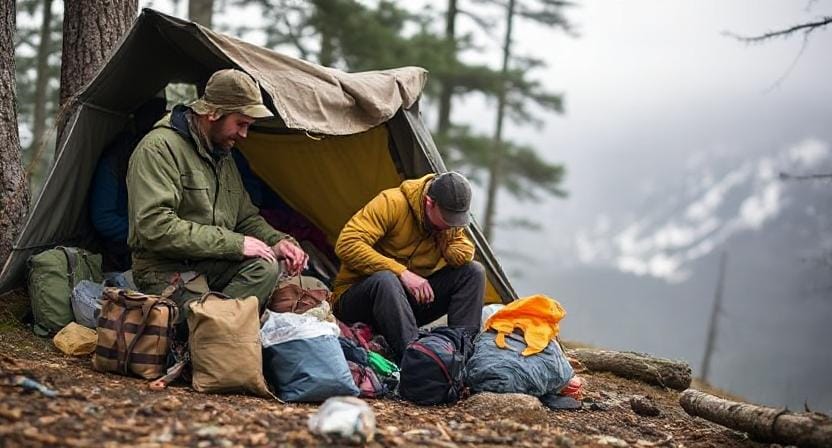
Let’s not ignore clothing! In case of emergencies where you might find yourself outside longer than expected (like waiting for someone else to get off the couch), packing extra clothes is essential. Think layers—a good thermal base layer will make all the difference between shivering uncontrollably or feeling cozy while waiting out the storm.
Shelter is such a big deal. If your home gets damaged from floods or strong winds, knowing how to make a temporary home can really help. Just imagine feeling a bit safer when things get wild outside.
A lightweight tarp is super handy. You can throw it over some branches or poles and create a little shelter in no time. It’s like a quick hug when things feel chaotic. Plus, it works great if you’re out camping or just dealing with unexpected rain. Life throws those surprise showers at us when we least expect them, right?
Setting up a tarp isn’t that tough. Just tie it securely, and you’ve got yourself some coverage. You’ll feel like a pro! Having a warm and dry place makes everything better, even in the middle of a storm.
Think about how nice it is to know you’ve got options. That peace of mind? It’s like having a warm cup of cocoa on a chilly night. You’ll feel ready to face whatever comes your way, knowing you can keep yourself safe!
Tools That Make Life Easier
Let’s speak about tools now. In our emergency plans, they are like little heroes! What do I have in my toolbox? It generally contains duct tape and a lot of “I hope this works!” You know what I mean. But having tools you can count on definitely helps when things go rough.
A multi-tool changes the game. You have a superhero in your pocket! You have a knife, pliers, and a screwdriver all in one. Great for those times when you don’t anticipate them. Like when you can’t get a package to open no matter what you do. You will be quite delighted to have something sharp close by. You feel like MacGyver a little bit, don’t you?
You also need flashlights. When the power goes out, they can light up the darkest corners, which is really useful. Just think about it: it’s not fun to bounce around in the dark. And additional batteries? They are the best! You don’t want to be stuck in the dark, thinking about how long it’s been since you cleaned under the couch. Oh no!
Being ready for anything involves having the right tools. It’s nice to know that you’ll feel more in control. Like having your warmest blanket on a cold night, it’s all about feeling protected and ready. And who wouldn’t want that?
Featured Snippet: Preparing for natural disasters starts with a simple plan and the right supplies. A basic emergency kit, backup communication tools, stored documents, and extra clothing can make a life-saving difference. Planning ahead gives you confidence and control during chaos, helping you protect your family when the unexpected happens.
Frequently Asked Questions
What should be included in a basic emergency kit?
A basic emergency kit should include water, non-perishable food, a flashlight, batteries, a first aid kit, hygiene items, and a multi-tool. These supplies help you stay safe and self-sufficient during the first 72 hours of an emergency.
How much water should I store for emergencies?
Store at least one gallon of water per person per day for a minimum of three days. This covers drinking, basic hygiene, and minimal food preparation needs during a disaster.
Why is a family communication plan important?
A communication plan makes sure family members know how to reach each other if cell networks go down or you get separated. It includes meeting locations, emergency contacts, and backup communication tools.
Where should I keep important documents during a disaster?
Keep copies of IDs, insurance papers, medical records, and emergency contacts in a waterproof folder stored in your emergency kit. It’s also smart to save digital copies on a USB drive.
What tools help during power outages?
Backup tools like flashlights, extra batteries, portable chargers, and weather radios are vital during outages. They help you stay informed, connected, and safe until power is restored.
How can I stay warm if I lose heat during a disaster?
Pack thermal clothing, hats, gloves, blankets, and an emergency foil blanket. Staying dry and layering clothing helps prevent hypothermia in cold conditions.
How often should I update my emergency supplies?
Review and refresh your emergency kit every six months. Replace expired food, medications, batteries, and update documents or contact information as needed.
Resources For further reading on emergency preparedness:
American Red Cross Emergency Preparedness
https://www.redcross.org/get-help/how-to-prepare-for-emergencies.html
Ready.gov – Disaster Supply Kit
https://www.ready.gov/kit
CDC Emergency Preparedness & Response
https://emergency.cdc.gov/preparedness/

Kevin Collier is a seasoned outdoor enthusiast and writer for Trekbug.com, specializing in outdoor adventures, survival strategies, and prepping insights. With a deep love for nature and a commitment to self-sufficiency, Kevin empowers readers to embrace the wilderness confidently. He shares valuable tips, practical techniques, and inspiring stories, helping both novice and experienced adventurers develop essential skills for surviving and thriving in the great outdoors.




